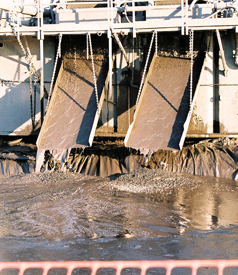New rules going into effect Wednesday will place Wyoming at the forefront of the national push to disclose chemicals used in hydraulic fracturing, the drilling technique that’s been suspected of polluting groundwater in parts of the country with vast reservoirs of untapped natural gas.
If the rules work as promised, they should provide the most comprehensive accounting yet of exactly what substances drilling companies are injecting into particular wells, a level of specificity that goes beyond disclosures in Pennsylvania and New York, two states where drilling has been controversial.
As we reported last week, the U.S. Environmental Protection Agency is also pressing companies for more information about the chemicals in fluids, something they say is a trade secret. The agency holds the last in a series of community meetings on hydraulic fracturing, called fracking, on Wednesday in New York.
The new Wyoming rules say companies must submit to the Wyoming Oil and Gas Conservation Commission a full list of chemicals they plan to use in fracking operations on a well-by-well basis. Companies will also have to report the concentration of each chemical used once the job is done.
Drillers retain the right to claim that certain details of the chemical mix are proprietary and should be kept confidential. It remains unclear to what extent industry will make this claim, but the commission’s supervisor, Tom Doll, expects those cases will be the exception.
“What we’ve explained to the operators and what we expect is each of these components, whatever is in that mix, will have to be disclosed,” he said.
If so, the Wyoming rules would offer the most detailed look so far at the composition of drilling fluids.
While the EPA has sought disclosure, the agency said the list of chemicals would be kept confidential. In Pennsylvania, a couple of companies responded to public concerns by partially disclosing the chemicals used there. The companies list hazardous components and their concentration by well, but do not provide a full list of chemicals.
It’s a crucial time to fight ignorance – help Truthout get the word out by donating here.
New York and Pennsylvania have published lists of chemicals used, but these lists simply name chemicals that may be in any given well and do not detail the mixtures or concentrations. New York has proposed but not yet adopted rules similar to Wyoming’s.
Wyoming’s rules require companies to list a unique identifier for each chemical. Drillers must give a list of chemicals they plan to use before drilling for commission approval. After the job is done, they must report what they ended up using.
Environmental groups say the jury is out on what ultimately will become public.
“The devil’s in the details, and I’m sure there’ll be lots of discussion about what can be proprietary,” said Deb Thomas, an organizer with the Powder River Basin Resource Council, which has pushed for tighter regulation and full disclosure of fracking fluids.
If a company argues certain chemical mixtures are proprietary secrets, Doll said it would be up to the Wyoming commission, chaired by Gov. Dave Freudenthal, or state courts to rule on disclosure. If a claim of trade secrets were upheld, companies still must disclose the full list to regulators but the information would be kept from the public.
John Robitaille, vice president of the Petroleum Association of Wyoming, said the industry does not expect problems complying with the rules.
Wyoming officials have expressed concerns that the federal government may step in to regulate fracking on state lands. In March, Doll was quoted saying that the coming rules, prompted by Freudenthal, were specifically intended to preclude EPA regulation by requiring greater disclosure.
A spokeswoman for the governor said that was only part of his motivation.
“One thing was the governor’s concern in how he answered the average person’s question: Governor, how do I know this is safe?” said Leigh Anne Manlove. “There’s also a belief that Wyoming is best able to regulate what happens in Wyoming.”
Thomas applauded the Wyoming oil and gas commission’s move, but questioned the governor’s motives. As ProPublica reported earlier this month, the EPA recently warned residents of a Wyoming town about noxious chemicals lacing their water supply, saying people should use fans while bathing or washing clothes to avoid the risk of explosion. The agency is investigating whether extensive drilling nearby is the source of the pollution.
“He should be wanting these rules to protect the people that live in this state,” Thomas said of Freudenthal, “not to keep the federal government out of the state.”
Enforcement is another issue. Drilling companies are supposed to post a notice including the list of chemicals for each well they plan to drill. Doll said his inspectors will check to ensure compliance, but he said he has only 12 of them. Last year, he said, about 3,200 fracking operations were performed in the state.
“We won’t hit every one of them,” he said. “You can’t do that with 12 people.”
Join us in defending the truth before it’s too late
The future of independent journalism is uncertain, and the consequences of losing it are too grave to ignore. To ensure Truthout remains safe, strong, and free, we need to raise $43,000 in the next 6 days. Every dollar raised goes directly toward the costs of producing news you can trust.
Please give what you can — because by supporting us with a tax-deductible donation, you’re not just preserving a source of news, you’re helping to safeguard what’s left of our democracy.
